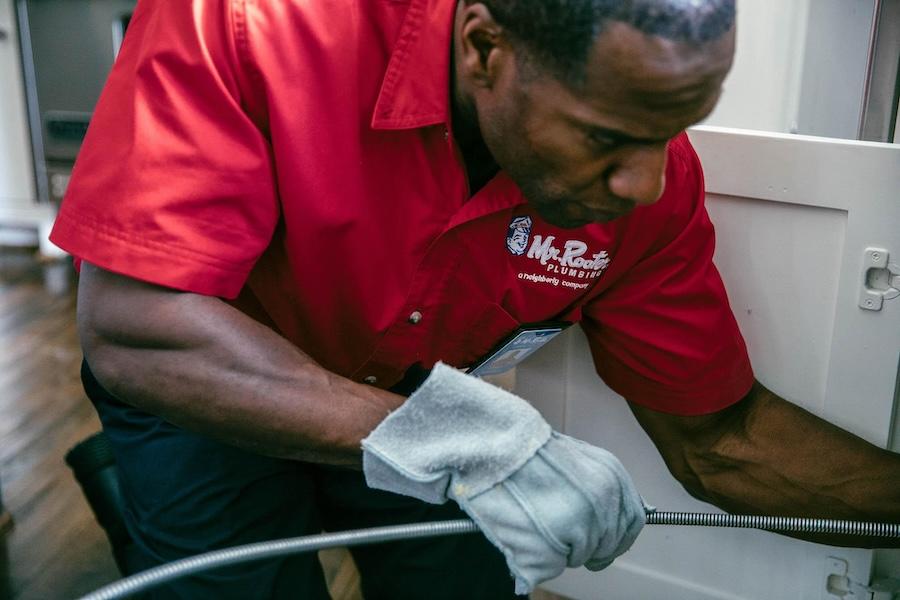Call This Monday to Get $50 OFF
Call us Now to Get $50 OFF.
Ratings based on 6379 reviews
Local Plumbers, Local Reviews
Call This Monday to Get $50 OFF
Call us Now to Get $50 OFF.
Ratings based on 6379 reviews
Local Plumbers, Local Reviews

Is your clogged drain causing problems every morning and evening? It’s easy for plumbing problems to frustrate your plans for the day. Let the team at Mr. Rooter Plumbing show you how to avoid slow-draining sinks and backed-up showers. Keep reading to learn more about the most common causes of drain blockages so you can keep your pipes clear and your schedule problem-free.
Strands of hair can quickly accumulate in shower and tub drains, where they bind with soap scum and grime and create stubborn blockages. If you have several people in your household with long hair or you have pets, this is likely to be a recurring issue. Use drain covers and hair catchers to reduce buildup, and clean your drains every month to prevent hair from becoming too dense. It’s also a good idea to brush your hair before you take a shower to minimize loose strands.
Conventional bar soap contains oils and fats that can combine with minerals in your water supply to form soap scum. The sticky residue will cling to your pipe walls and eventually narrow the passageway where wastewater flows. Switch to liquid soap and flush your drains once a week with baking soda and vinegar, followed by hot water to break down buildup and keep your pipes clean.
When it’s in the pan, fat and grease are liquified, and it easily slips down your drains. However, once it’s inside your pipes, it cools off and becomes solid. Eventually, accumulated grease will coat the inside of pipes and start to trap food. This creates a thick blockage that is very difficult to remove. Don’t pour grease down your drain; instead, put it in a sealed container or wipe down pots and pans with paper towels before you put them in the sink. You might want to install a grease trap to help capture excess fats and oils so they don’t go into your plumbing system.
The only items that should go into your toilet are human waste and toilet paper. Anything else could result in clogs. Items that are labeled flushable should also be avoided, including wipes. These will not break down in your pipes the same as toilet paper and will get lodged deep inside your pipes, where they may lead to future repairs and sewer backups. Provide waste bins in your bathrooms to prevent people from flushing cotton balls, dental floss, and feminine hygiene products. Be sure to discuss this with household members and guests as well. If you have young children, consider securing the toilet lids with safety devices so they don’t flush toys or small items.
Pipes that aren’t aligned properly can make your plumbing system vulnerable to clogs. Incorrect pipe grading, low-quality materials, and misaligned joints can all cause recurring blockages. If you’re concerned that your frequent plumbing backups are caused by pipe issues, a plumber can inspect your system to identify and correct any problems. If you need pipe replacement, repair, or installations in the future, be sure to hire reputable plumbers who can perform the task well.
Many people don’t see a connection between trees and plumbing systems. However, thirsty roots from nearby trees and shrubs will often find water and nutrients inside pipes and enter through small cracks. Over time, these tiny roots grow larger and eventually block the entire pipe. This is very common in aging sewer lines. Routine inspections and maintenance plumbing services can detect early signs of root intrusion so you can avoid unexpected emergencies. Root barriers and pipelining can help protect your system from roots in the future.
Having a garbage disposal doesn’t mean you can put whatever you want into your sink without consequences. Eggshells, pasta, fibrous vegetables, and coffee grounds can all create serious blockages that cause problems with your entire plumbing system. Scrape your food scraps into the trash can or compost bin before rinsing them in the sink. Doing this will help prevent trouble and will increase the longevity of your disposal.
Homes with hard water are prone to mineral buildup in their pipes. Deposits will grow over time and restrict water flow. Scale buildup can also harm appliances like dishwashers and water heaters, so it’s important to take care of this common problem if you see signs of trouble. A water softener is the best way to permanently reduce mineral deposits and keep your plumbing system flowing. It’s also helpful to regularly descale and clean your pipes, showerheads, and faucets to reduce hard water issues.
When clogs strike, call Mr. Rooter Plumbing. We provide dependable services for lasting results. Our team uses advanced techniques and equipment to diagnose problems and fix clogs fast. Whether you need a hydro-jetting service or a total pipe replacement, our plumbers are ready to help restore your system. Contact us to schedule your next plumbing service.
As a society, the delivery of clean water through various systems is one of the…
Read MoreAre you worried that the constant trickle of water in your toilet is the cause…
Read MorePlumbing problems are the one incident every homeowner dreads due to their expensive repairs and…
Read MoreWater heaters are vital appliances that keep households and commercial establishments running efficiently. Whether it is showering, drinking,…
Read MoreWhen it comes to leaks, not all of them are visible to the naked eye. Sometimes, the pipes…
Read More